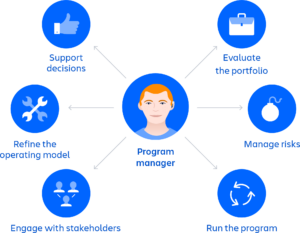Programs and projects are at the heart of many business endeavors. To use a metaphor, projects are like trains operated by project managers, who help pull the work of a team to achieve goals and ultimately arrive with a finished good or service.
To continue with the metaphor, a program is like a collection of trains running on different tracks, yet headed to the same station, or goal. The program manager is the station conductor, directing the various project trains.
Projects have:
- A set of tasks with a clear deliverable and a deadline for completion
- Relates to creating, updating, or reviewing a particular document, process, outcome, or another single unit of work
- A predefined scope that is limited to a specific output
- Improves quality, efficiency, cost management, or customer satisfaction in a specific and predetermined way
Programs have:
- Unknown or fluid deadlines due to the large scope and impact of the work that must be done continuously over a long period of time
- Multiple deliverables with inter-related dependencies that may continue to evolve based on changing business needs
- A series of deliverables completed together to increase efficiency, accuracy, reliability, or other business needs
- The work enables the company to achieve a long-term business goal or initiative that will run in perpetuity
- Success delivers long-term benefits or unlocks new capabilities for the organization
What does a program manager do?

Program managers need to balance delivering artifacts, engaging with strategic decisions, managing stakeholders, and mitigating risks across the program. In a fully empowered organizational program, program managers should be able to solve — or connect to people who can solve — and plan to mitigate any problem that impacts the strategic initiative they seek to achieve.
Because of the breadth of their responsibilities, program managers play a key enabling role in companies. The role is flexible by design to meet the different challenges that teams encounter while going to production.
On any given day a program manager may do any of the following tasks:
Evaluate the state of the portfolio
A program manager reviews and evaluates a portfolio by connecting with teams to identify any risk mitigation or improvement opportunities. These connections can be coffee chats or team meetings. The program manager’s goal is to stay connected and engaged enough to work in lockstep towards shared goals. This includes connecting with project teams to ensure the project managers are supported and unblocked.
Manage risks
Risk management is a key element of portfolio management. Risks include a project timeline slipping, changing requirements, or the discovery of additional stakeholders. A program manager should be aware of anything that could impact the progress or outcome of the program and related projects. Ideally, a program manager can take corrective actions to reduce or manage risks in the portfolio.
Run the program
Program managers are responsible for running the program, which includes:
- Managing budgets and resources in cooperation with project managers
- Defining the operating parameters and controls
- Maintaining the core elements of the program that set the foundation from team charters and other establishing documents
Engage with stakeholders
A program manager connects with stakeholders to get a sense of the wider context that surrounds goals. These conversations provide key insights into the overall landscape. By partnering with stakeholders, a program manager can help guide project teams.
Refine the operating model
The operating model shapes how teams progress toward their goals. This can include establishing communication channels and reporting methods, identifying goals, establishing priorities across the entire program. During the course of a program, a program manager optimizes the operating model to increase the likelihood of success and reduce the impact of risks.
Support decisions
Decision-making takes many forms, from running a meeting with decision-makers, to compiling background information on what decisions are needed, or doing a comparative analysis of multiple options. Specific program managers may lean into different areas, depending on their strengths. The program manager reviews outcomes to identify opportunities for improvement in systems, processes, or results.
The focus and scope of each program manager shape the specifics of how they engage with these practices.
What does a project manager do?
A typical day for a project manager can include:
- Checking on the status of a deliverable to determine whether it will be delivered on time and within budget
- Reviewing a queue to identify new work, monitor existing tasks, and unblock specific elements for the project team
- Create a plan for how to reach a specific milestone that describes the stakeholder management and communications opportunities
- Ensure that project work meets the quality and reliability requirements established at the beginning of the project
As you can see, program and project managers work on highly related tasks. The primary difference between these two roles is scope and ambiguity:
- Projects are scoped tightly and controlled from the beginning, while programs have a larger scope that may change over the course of the program.
- Projects have limited ambiguity because success has been clearly defined at the start, while programs need to work through ambiguity to define what needs to be done and how to conceptualize “success” for the overall program.
Read more: https://www.atlassian.com/agile/project-management/program-management





